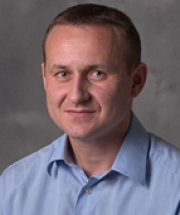My laboratory investigates molecular mechanisms underlying eukaryotic genome stability. Chromosomal rearrangements create genetic variation that can have deleterious or advantageous consequences. Karyotypic abnormalities are a hallmark of many tumors and hereditary diseases in humans. Chromosome rearrangements can also be a part of the programmed genetic modifications during cellular differentiation and development. In addition, gross DNA rearrangements play a major role in the chromosome evolution of eukaryotic organisms. Therefore, elucidation of molecular mechanisms leading to chromosome instability is important for studying human pathology and also for our understanding of the fundamental processes that determine the architecture and dynamics of eukaryotic genomes.
My overall contribution to the field of genome instability has been the demonstration of the phenomenon that repeats often found in eukaryotic genomes are potent sources of genome instability. Specifically, I have been investigating one of the most fundamental and enigmatic processes as to how repetitive sequences that adopt non-canonical DNA secondary structures, such as hairpins and cruciforms, cause replication arrest, double-strand breaks, and gross chromosomal rearrangements. Using molecular biology approaches, we investigate the instability of secondary structure-forming repeats in Saccharomyces cerevisiae, Schizosaccharomyces pombe, and human fibroblasts.
Additional Research
Using yeastSaccharomyces cerevisiaeas a model, my laboratory investigates molecular mechanisms underlying eukaryotic genome stability. Chromosomal rearrangements create genetic variation that can have deleterious or advantageous consequences. Karyotypic abnormalities are a hallmark of many tumors and hereditary diseases in humans. Chromosome rearrangements can also be a part of the programmed genetic modifications during cellular differentiation and development. In addition, gross DNA rearrangements play a major role in chromosome evolution of eukaryotic organisms. Therefore, elucidation of molecular mechanisms leading to chromosome instability is important for studying the human pathology and also for our understanding of the fundamental processes that determine the architecture and dynamics of eukaryotic genomes. Myoverall contributionto the field of genome instability has been the demonstration of the phenomenon that repeats often found in higher eukaryotic genomes including the human genome are potent sources of double-strand breaks (DSB) and gross chromosomal rearrangements (GCR). Specifically, my lab, is investigating how repetitive sequences that can adopt non-B DNA secondary structures pose a threat to chromosomal integrity dictated by their size and arrangement. Currently three sequence motifs are studied in my laboratory: inverted repeats; Friedreich's ataxia GAA/TTC trinucleotide repeats and G-quadruplex-forming tracts. We also are collaborating with Dr. Malkova lab, University of Iowa, to study one of the outcomes of the DSB formation at unstable repeats - break-induced replication.






